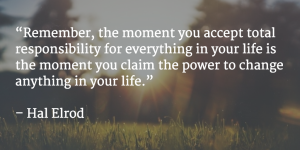1-Sentence-Summary: The Miracle Morning makes it clear that in order to become successful, you have to dedicate time to personal development each day, and then gives you a 6-step morning routine to create and shape that time.
Read in: 4 minutes
Favorite quote from the author:

Table of Contents
Video Summary

Almost a year ago I came across this book on Blinkist. I liked the routine so much, I immediately implemented it, long before actually getting the book. After I read it, it quickly became one of my favorite reads of all time.
Hal Elrod’s story is fascinating. After being declared dead from a car crash for 6 minutes and being told he’d never walk again, he miraculously healed, and after even more ups and downs developed this morning routine. Don’t be surprised to not see the actual routine in my lessons, more on that later.
Here are my takeaways from The Miracle Morning:
- Don’t isolate incidences in your life.
- You can get a good night’s sleep, even if it’s just 4 hours.
- Have a pre-morning routine to get out of bed faster.
Let’s take a closer look!
The Miracle Morning Summary
Lesson 1: Don’t isolate incidences.
Hal suggest you don’t look at the events in your life as separate, but all part of the bigger picture. For example you might say to yourself: It’s okay if I skip gym today, I had a long day at work, it’ll be just this once.
However, this not only affects this particular moment, this also changes who you become. If you tell yourself it’s okay to skip gym once, you’re more likely to do it again, because you already gave yourself permission last time and eventually become someone who skips gym – a slacker.
Exceptions quickly become the norm and before you know it you find yourself in a sea of bad habits.
So don’t skip your good habits, because how you do anything is how you do everything.
Lesson 2: You can get a good night’s sleep, even if you just sleep 4 hours.
This wasn’t part of the summary, but I know how Hal found this out from the book.
He slept for varying amounts. 4 hours, 5 hours, 6 hours, etc. He found that no matter whether he slept 4 hours or 9 hours, if he told himself it would be too little sleep the night before, he woke up tired, groggy and miserable.
On the other hand, when he told himself he’d feel good, refreshed and have a great day, he woke up in a great mood and energized, even with as little as 4 hours of sleep.
I’m living this right now. It works. Yesterday I went to bed at 9:20 pm, but my freaking upstairs neighbor had a party. I told myself I’d be fine and even if I only got 6 hours I’d feel good in the morning.
I finally fell asleep at 10 pm, only to be woken up by our door bell (yup, they rang) at 2 am in the morning. Then the party went on, and when they started “having fun” at 4 am in the morning, I got up.
I have a commitment to this blog, after all.
I’ll publish this article a little late, but I feel quite good. Last year I would tell myself the opposite and feel terrible with anything under 7 hours of sleep, just because I told myself I would.
The lesson: You can create your own reality. Your mind’s power over your body is real, so use it.
Lesson 3: Have a pre-morning routine to get out of bed faster.
This is what happens before you start your Miracle Morning, and even if you find a morning routine is not for you, this will help you.
It actually starts the night before with lesson 2. Also, place your alarm at the other end of your room, so you have to physically get up to turn it off.
Once you’re up, immediately do these 3 things (in whichever order you prefer):
- Have a glass of water.
- Brush your teeth.
- Wash your face.
These 3 things alone will wake you up enough to get going and make sure you can start your Miracle Morning routine.
The Miracle Morning Review
As one of my all-time favorite summaries on Blinkist, this one definitely belongs on Four Minute Books. If you want a more in-depth summary of the book and Hal’s story, I’ve written a longer Miracle Morning summary here.
If you actually want to implement the SAVERS routine, which includes silence, affirmations, visualization, exercise, reading and writing, you can read my in-depth guide here – I sent it to Hal before publishing it, he liked it, so that’s a good sign.
The advice from lesson 1 seems contrary to what Learned Optimism suggests at first. Optimism is about seeing negative events as isolated incidences – but only the ones you can’t control. What Hal talks about is not making excuses and making the right choices when you are in control, but doesn’t mean you should beat yourself up for failures.
Both the summary and the book are great, I suggest you read either one of them and then give the routine a try. You can always dive deeper and perfect it as you go along! Cheers to crafting your very own Miracle Morning!
Audio Summary
Listen to the audio of this summary with a free reading.fm account:
Who would I recommend the Miracle Morning summary to?
The 52 year old, who wants to use her mornings to work on awesome projects that will help her lead a great second half of her life, the 37 year old, who works hard, and thus can’t find the time to work on his personal projects, and anyone who thinks mornings are the worst.
Last Updated on July 27, 2022